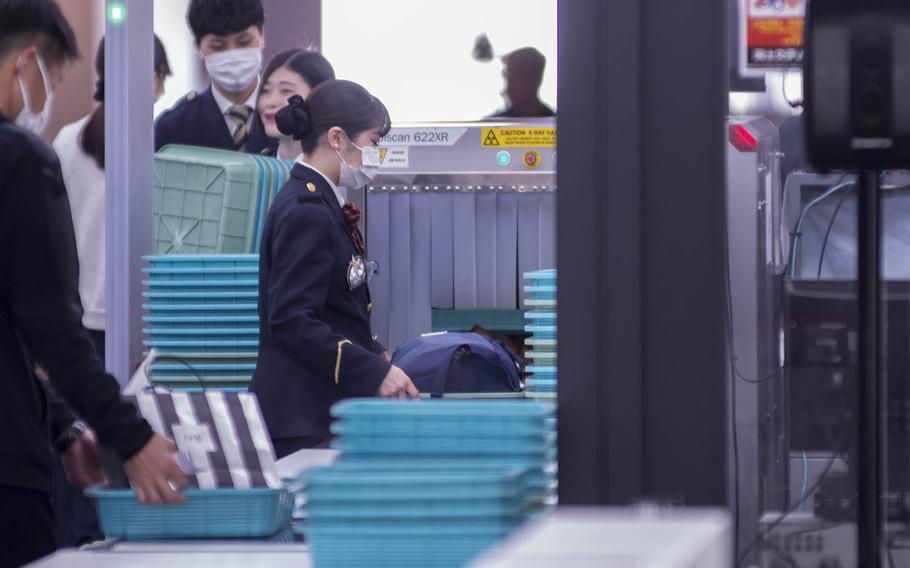
Travelers pass through a security checkpoint at Haneda International Airport in Tokyo, March 18, 2020. (Akifumi Ishikawa/Stars and Stripes)
Stars and Stripes is making stories on the coronavirus pandemic available free of charge. See other free reports here. Sign up for our daily coronavirus newsletter here. Please support our journalism with a subscription.
TOKYO — New restrictions by the Japanese government on travelers entering the country from the United States will not further impact U.S. military personnel already under similar restrictions, according to U.S. Forces Japan.
Japanese Prime Minister Shinzo Abe on Monday said Japan will require all travelers entering from the U.S. to isolate themselves for 14 days upon arrival to stem the spread of coronavirus, now a global pandemic.
“We’re not expecting this to have any effect on USFJ,” Air Force Lt. Col. Robert Firman, a USFJ spokesman, said Tuesday. “Our policy toward our own personnel returning to Japan from anywhere in the world has already required this same level of restriction.”
As of Monday, Japan has reported 1,089 cases of coronavirus and 41 deaths from the respiratory disease it causes, according to the World Health Organization.
Beginning Thursday, all travelers entering Japan from the U.S., including Japanese citizens, via aircraft and ships will be asked to self-quarantine at home or in other quarters, Abe said during a meeting at the the Novel Coronavirus Response Headquarters in Tokyo. New arrivals will also be asked not to use public transportation, he said.
Department of Defense uniformed personnel, civilians and dependents traveling through Japan and other countries where the coronavirus is a significant risk have been ordered to stop movement until May 11, USFJ’s official website states.
The stop movement order includes all official travel, including permanent changes of station, travel for temporary duty and government-funded leave, according to the website. Service members’ personal leave and other non-official travel is included, as well.
Exceptions may be granted for mission-essential travel, humanitarian reasons or extreme hardship, the website states.
“At the conclusion of the 60 days, which began March 13, 2020, the DoD will reevaluate the stop movement policy and issue follow-on guidance, as necessary,” USFJ states on its website.
Japan’s new travel restrictions will be in place until the end of April and could be extended, Abe said.
They are intended “to be in line with efforts by other countries including the U.S. to further prevent worldwide spread of the infection,” he said.
Japan’s Ministry of Foreign Affairs’ website advises travelers to find a place they can stay during the 14-day self-quarantine and to find a means of transportation to that place before they arrive in Japan.
“We continue to monitor and analyze infection information from other countries and will not hesitate to take flexible border control measures,” Abe said.
kusumoto.hana@stripes.com Twitter: @HanaKusumoto
robson.seth@stripes.comTwitter: @SethRobson1